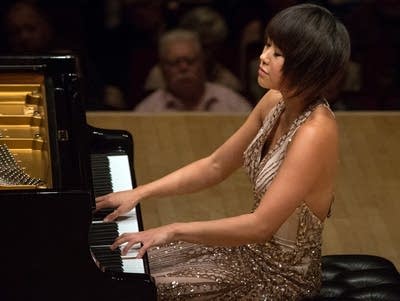When critics talk about Yuja Wang, they continue to reach for superlatives. Earlier this month Mark Swed of the Los Angeles Times referred to her as one who "eats the world's greatest keyboard challenges for breakfast with one hand tied behind her back." The headline for the Orange County Register review of the same concert Swed gushed over read: "Yuja Wang astonishes in recital …" And a New York Times review from three years ago contains words such as "apocalyptic" and "exhilarating."
If she reads her reviews, the pressure for Wang could be formidable. But she thrives in the spotlight, and as she told NPR in 2013, performing is how she leaves the solitary musician's life behind. "The only time you actually get to communicate is onstage with music," she said.
Wang had plenty to communicate in this Carnegie Hall recital, especially considering its centerpiece — Beethoven's longest piano sonata, the notoriously strenuous "Hammerklavier," Op. 106 in B-flat. In his book Beethoven: Anguish and Triumph, Jan Swafford describes the 45-minute work, specifically the outer movements, as "excessive beyond ease and beyond pleasure, sometimes nearly beyond human, though they enfold moments of wonderful beauty. The superhuman and the intimately human are both part of the Hammerklavier."
And as if that epic sonata weren't enough, Wang preceded it with music that makes both physical and psychological demands — the first two Ballades by Brahms and Schumann's Kreisleriana. The ominous chords that open the Ballade No. 1 signal the gruesome story to come. Brahms based the shifting, almost argumentative music on a Scottish murder ballad called "Edward." In Brahms' version, the piano takes on two personalities — a mother questioning her son about the blood on his sword. The second Ballade is more lyrical and inward-looking, with an alternately forceful and skittering middle section.
There are also multiple personalities in Schumann's Kreisleriana, an eight-movement suite. In this music, which alternates between agitation and serenity, Schumann's piano becomes a stage for the composer's two alter egos: Florestan, flamboyant and impetuous, and Eusebius, thoughtful and introspective.
After all the exertion of this hefty program, Wang was not by any means finished. Her final messages to the audience came in the form of four encores, including finger-twisting showpieces by Liszt, Vladimir Horowitz and Russian virtuoso Arcadi Volodos.
Program:
Brahms: Ballade No. 1 in D minor, Op. 10, No. 1
Brahms: Ballade No. 2 in D major, Op. 10, No. 2
Schumann: Kreisleriana, Op. 16
Beethoven: Piano Sonata No. 29 in B-flat, Op. 106, 'Hammerklavier'
Encores:
Schubert-Liszt: "Gretchen am Spinnrade"
Horowitz: Variations on a Theme from Carmen
Mozart-Volodos: "Turkish" Rondo
Chopin: Waltz in C-sharp minor, Op. 64, No. 2
Yuja Wang, piano.
Copyright 2016 NPR. To see more, visit http://www.npr.org/.
Love the music?
Show your support by making a gift to YourClassical.
Each day, we’re here for you with thoughtful streams that set the tone for your day – not to mention the stories and programs that inspire you to new discovery and help you explore the music you love.
YourClassical is available for free, because we are listener-supported public media. Take a moment to make your gift today.


